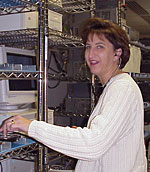By Art Hughes
December 1 , 1999
Part of MPR's "Minnesota in the .Com Age" special
|
|
RealAudio 3.0 |
There's never been a better time to find work in Minnesota's high-technology
industries. The state's strong economy and low unemployment rate, has firms
competing for the best workers with high pay, attractive benefit packages and
flexible hours. But such attractions increasingly come at the price of other
values, such as job security and a sense of belonging in a company.
| |
|
|
|
||
Scanlon: It's kind of a drug. The disk-drive industry is kind of a drug. The pace at which it moves is very fast. It gets your juices going almost every day. It's a lot of fun. From concept to high-volume production, we're a little less than a year.Scanlon, a chemist by education, moved to Western Digital four-and-a-half years ago after a dozen years with IBM across town. She says the transition from a huge corporation to a much-smaller one was a shock at first. At IBM she said she felt secure and cared for. The company encouraged workers to participate in extra training programs to keep them current in their fields. It also offered many avenues for career development.
At Western Digital on the other hand Scanlon says everything is up to her.
Scanlon: So it's important to stay current. It's important to stay on your game. It's important to keep up skills you need to keep alive so you're marketable for more than just the disk-drive industry. If drives were to be replaced by some miracle invention tomorrow, I would need to work somewhere else.Lifetime employment at IBM was a tradition established by founder Thomas Watson. But these days even "Big Blue," as it's known, has had to adjust to a workforce of cubicle nomads who cherish high pay over job security and stock options over a gold retirement watch. Making that transition has been painful for many.
Janet Krueger began at IBM 23 years ago, back in the days of punch-card computers. She followed in the footsteps of her father who worked there for 33 years. She even went to school on an IBM Watson Fellowship. But she quit last July after IBM launched what's called a cash-balance pension plan. The new scheme shifted from rewarding long service to providing a transferrable nest egg for mobile, younger workers. Krueger says the pension switch was the final straw.
Krueger: What's been upsetting for me is you went from a company that took morale and currency as a very serious number-one responsibility and they shifted almost overnight to "That's not our job anymore. We're not gonna worry about it. If you can't stay current we don't need you anymore."The new importance of specialized skill sets highlights a broader problem for companies in high tech industries, and for policy makers. The Minnesota Department of Economic Security estimates the state's educational institutions will train barely one-eighth the number of workers high-tech firms predict they'll need over the next 10 years.
Former state representative Becky Kelso is director of a year-long initiative called Upgrade Minnesota. Its goal is to increase the number of technologically-skilled workers within the state. She says a lot of people are intimidated by the demanding pace.
| |
|
|
|
| |
|
Kelso: We are really talking about occupations, professions and skills that are going to be changing at a very rapid pace. It's a constantly-moving target. And a matter of constant upgrading and refining their skills. There are people who can profit from that type of training but they don't even know what it is.
The good news Kelso says, is that contract work, so-called e-lancing, in which
professionals drop in for a specific project then shop around for the next job
when that's done, has a great amount of flexibility that many workers in their
50's and 60's want.
The question is whether those who have known the security of the old corporate
environment view such opportunities as blessing, or a curse.
 |

